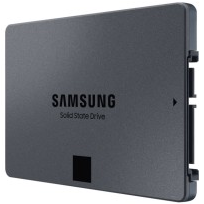New
#1
Hmm no Pro or Evo in 870 guise?

Samsung Electronics today introduced its second-generation quad-level cell (QLC) flash drive, the 870 QVO SATA SSD, that is setting a new standard for high-capacity consumer storage. Featuring an industry-leading capacity of up to eight terabytes (TB),1 the new SSD delivers an uncompromising mix of speed, storage capacity and reliability for mainstream and professional PC users.
In the past, consumers have had to choose between SSDs – which provide superior performance – and HDDs, which traditionally offer greater capacity. Samsung’s 870 QVO SSD, however, is able to reliably offer the best of both worlds, making it an optimal choice for mainstream PC users who prioritize performance and value, as well as for professional users who require high levels of capacity.
“Following the launch of Samsung’s first consumer QLC drive – the 860 QVO – in 2018, we are releasing our second-generation QVO SSD which offers doubled capacity of 8TB as well as enhanced performance and reliability,” said Dr. Mike Mang, vice president of the Memory Brand Product Biz Team at Samsung Electronics. “The new 870 QVO will allow more consumers to enjoy the performance benefits of an SSD at HDD-like capacities.”
The 870 QVO offers best-in-class sequential read and write speeds of up to 560 MB/s and 530 MB/s respectively,2 with the drive’s Intelligent TurboWrite technology allowing it to maintain peak performance levels using a large variable SLC buffer.3 The 870 QVO also delivers a 13% improvement in random read speed4 compared to the 860 QVO, making it ideally suited for everyday computing needs such as multitasking, gaming and web browsing. The renewed Data Migration and Magician 6 softwares provide a host of improved and added features, enabling users to upgrade, manage and optimize their SSDs with greater ease.
In addition to the industry-leading capacity and performance, the 870 QVO provides an exceptional endurance rating of up to 2,880 terabytes written (TBW), or a three-year limited warranty.5
The 870 QVO comes in 1TB, 2TB, 4TB and 8TB models, and will be available from June 30, 20206 with a manufacturer’s suggested retail price starting at $129.99 for the 1TB model. To find out more, please visit samsung.com/ssd or samsungssd.com.
Key Specifications:
Category Samsung 870 QVO Interface SATA 6 Gbps Form Factor 2.5-inch Storage Memory Samsung V-NAND 4-bit MLC (QLC) Controller Samsung MKX Controller DRAM 8GB LPDDR4 (8TB)
4GB LPDDR4 (4TB)
2GB LPDDR4 (2TB)
1GB LPDDR4 (1TB)Capacity 8TB, 4TB, 2TB, 1TB Sequential Read/Write Speed Up to 560/530 MB/s Random Read/Write Speed Up to 98K/88K IOPS Management Software Samsung Magician Total Bytes Written
1,440TB (4TB)
720TB (2TB)
360TB (1TB)Warranty Three-year limited warranty
Source: Samsung Electronics Debuts Industry-Leading 8TB Consumer SSD, the 870 QVO – Samsung Global Newsroom
See also: Samsung Electronics Debuts Industry-Leading 8TB Consumer SSD, the 870 QVO - Samsung US Newsroom
SSDs vary in the number of bits each cell can hold. The more bits each cell is designed to hold, the cheaper it is to make (and the larger the capacity that's possible). The trade-off is that the more bits a cell holds, the harder it is to re-write a cell and the lower is its endurance before the cell fails.
Single level cells (SLC) have by far the longest endurance, with a price to match! Multi-level cells (MLC) can be 2, 3, 4 or more bits per cell. The more bits per cell the cheaper it is to manufacture, but the lower the Total Bytes Written (TBW) before a cell fails and has to be remapped.
Samsung's EVO range is a reasonable compromise for consumer use with 3-bit MLC, relatively inexpensive but with a warranty for five years or (for the 500GB 860 EVO) 300TB TBW. The PRO range is more expensive but more durable, the QVO range is cheaper but a 3 year warranty and a lower TBW than for an EVO of the same capacity, which in turn has a lower TBW than the equivalent PRO.
The key difference is that the QVO uses 4-bit MLC, the EVO uses 3-bit MLC and the PRO has 2-bit MLC.
I have had/have 2.5" SSD (not M2) 860 PRO's, 860 EVO's and 860 QVO's and I can tell you there are nearly the same speed.
The QVO drives will not slow down till it runs out of buffer and they have 1GB per 1TB of LDDR4 Ram then a large chunk (again dependent of the size of the drive) SLC cache as a 2nd buffer, to saturate this you would need to be moving massive video files about continually.
Example the 860 EVO 4TB has 4GB LDDR4 Cache and 78GB SLC 2nd Cache the EVO's work the same way but the PRO's do not need the 2nd Cache.
In common usage MLC has fallen into use as meaning 2 bit levels per cell, TLC 3, and QVO 4. Not sure anybody makes SLC (except for a cache) anymore - wear leveling for Enterprise MLC has achieved near the same endurance by taking advantage of the fact that different blocks wear at different rates and characterizing the durability for every block. This information is used by the load balancing algorithm to balance all blocks to their endurance instead of using a lowest common denominator and applying this cutoff to all blocks.
It is not only QVO that uses buffering in faster NAND to make up the performance difference. TLC (Samsung EVO) uses an SLC buffer too. Higher performance can only be sustained for a short period compared to the Pro which can sustain performance.